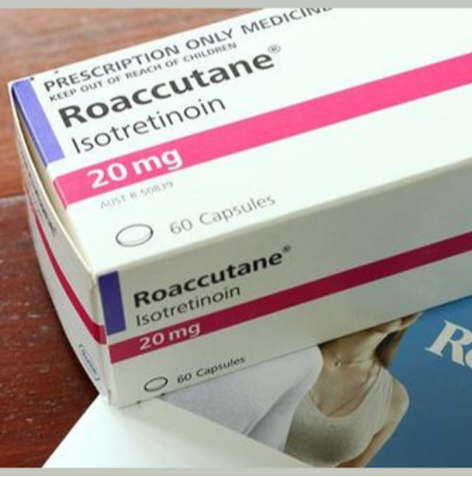What a Pharmacist Wants You to Know about Oral Isotretinoin (Accutane)
Oral isotretinoin (Roaccutane/Accutane) is a powerful vitamin A–derived medication used for severe or scarring acne.
It belongs to a group of medicines called retinoids. Isotretinoin works by reducing oil (sebum) production, unclogs pores, reducing acne-causing bacteria, and calming inflammation in the skin.
Because of the risk of potentially serious side effects, it is only prescribed for acne that hasn’t responded to other treatments like antibiotics or topical therapies, it’s only prescribed under specialist supervision with regular blood tests and check-ups.
Who is Isotretinoin best for?
Those with:
Severe acne (like nodular, cystic, or conglobate acne)
Acne that leads to scarring or significant psychological distress
Disclaimer: This is for general guidance only - eligibility must always be assessed by a medical professional.
Who should avoid isotretinoin?
Isotretinoin is not suitable - unless strictly approved by a specialist - for individuals who are:
Pregnant, breastfeeding, or trying to conceive
Allergic to isotretinoin, soya, peanuts, or its capsule ingredients
Living with liver/kidney disease or high liver enzymes
Having very high cholesterol/triglycerides or lipid disorders
Already high in vitamin A (hypervitaminosis A)
Diagnosed with inflammatory bowel disease (e.g. Crohn’s, ulcerative colitis)
With severe past psychiatric illness (e.g. depression, psychosis, suicidal thoughts)
Experiencing ongoing sexual dysfunction
-
People who could become pregnant must follow the Pregnancy Prevention Programme due to the risk of severe birth defects.
Pregnancy tests are required before starting, monthly during treatment, and one month after stopping.
Those with a history of depression or anxiety should be monitored closely, as mood changes can occur - though acne improvement often boosts wellbeing.
Limit intake to no more than 14 units per week to reduce liver strain.
Some people report reduced libido or dryness/erectile issues, occasionally persisting after treatment. Any concerns should be reported to the dermatologist.
-
Isotretinoin tackles all major causes of acne at once - that’s why it’s so effective.
It changes how skin cells grow and behave, which leads to the following benefits:
Reduces oil production by shrinking sebaceous glands
Prevents clogged pores by normalising skin cell shedding
Calms inflammation by reducing inflammatory activity in the skin
Makes it harder for acne-causing bacteria to grow (indirectly - it’s not an antibiotic)
Offers long-term remission by permanently altering sebaceous gland function
Unlike most acne treatments that only manage symptoms, isotretinoin targets the root causes - often leading to lasting results, even after treatment ends.
-
Post-Treatment: What to Expect
Early flare-up: Acne may temporarily worsen in the first 7–10 days - this is normal.
Improvement phase: Most people see clear results within 8–12 weeks. One course often gives long-term remission, though a second low-dose course may be needed.
After Finishing Treatment
Avoid vitamin A supplements - risk of toxicity.
Protect your skin from the sun: No sunbeds, limit sun exposure, and wear SPF 30+ daily.
Be gentle with skincare: No retinoids, peels, or harsh exfoliants right away. Focus on hydration, barrier repair, and non-comedogenic products.
Follow-up with your dermatologist if side effects persist or more treatment is needed.
Isotretinoin can be life-changing for the right person, delivering clear skin and renewed confidence. However, it is not a first-line treatment - it should only be used after other therapies have failed and under strict dermatological supervision.
Careful monitoring, informed consent, and a clear understanding of the risks and benefits are essential for safe and successful treatment.
Disclaimer:
The content provided on Revouza is for educational purposes only and is not a substitute for professional medical advice, diagnosis, or treatment. Always seek the guidance of a healthcare professional, such as a dermatologist or GP, regarding any questions or concerns about medications, skin conditions, or treatment options. Do not start, stop, or change any medication without consulting your healthcare provider. Individual responses to treatment may vary, and the information provided may not cover all possible side effects, interactions, or contraindications.
References
Layton AM. The use of isotretinoin in acne. Dermatol Ther. 2009;22(5):393–403.
Sundström A, Alfredsson L, Sjölin-Forsberg G, et al. Association of suicide attempts with isotretinoin: a review. BMJ. 2006;332(7549):1235–9.
MHRA. Isotretinoin: updated measures to prevent pregnancy and avoid psychiatric and sexual side effects. Drug Safety Update. March 2023. www.gov.uk
Zaenglein AL, et al. Guidelines of care for the management of acne vulgaris. J Am Acad Dermatol. 2016;74(5):945–973.e33.
Rademaker M. Isotretinoin: dose, duration and relapse. Australas J Dermatol. 2016;57(4):265–272.
https://www.nice.org.uk/guidance/ng198/chapter/recommendations#maintenance
https://synapse.patsnap.com/article/what-is-the-mechanism-of-isotretinoin
https://www.gov.uk/drug-safety-update/isotretinoin-roaccutanev-introduction-of-new-safety-measures-including-additional-oversight-of-the-initiation-of-treatment-for-patients-under-18-years-of-age
https://library.sheffieldchildrens.nhs.uk/oral-isotretinoin-therapy/#cmtoc_anchor_id_8
https://www.bad.org.uk/pils/isotretinoin/

